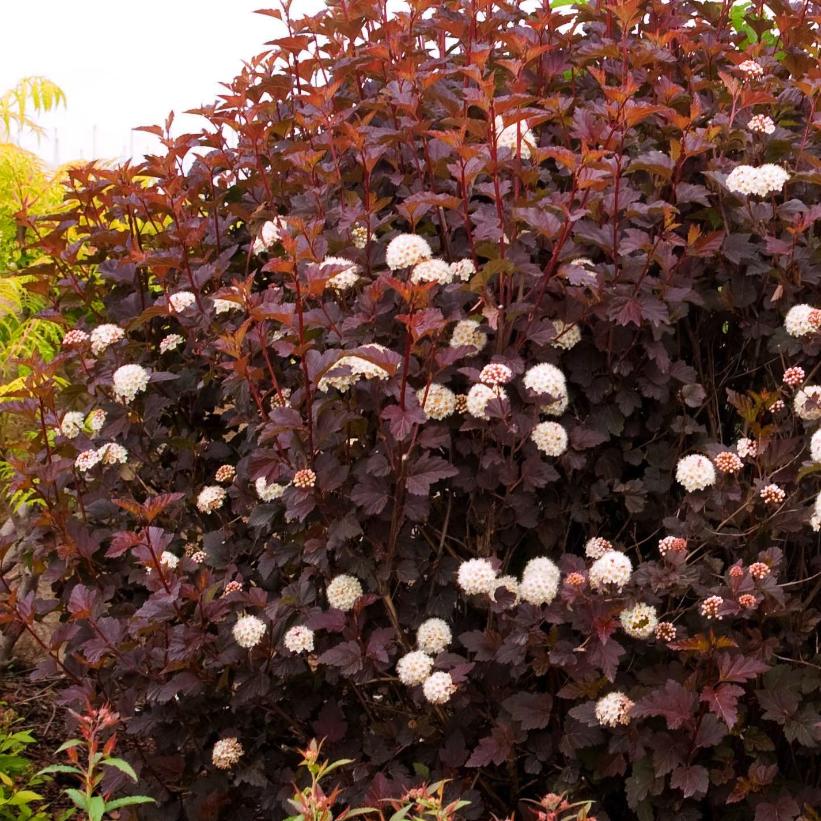
Physocarpus opulifolius Diabolo® ('Monlo') (PP11211, CPBR2892, COPF
Physocarpus opulifolius 'Diabolo,' the big, maroon-leaved form of ninebark, is a great shrub: easy and showy over a long season, a giant fountain-shaped creature that attracts attention even from a distance. But it's not the only variety I grow…there are others. Physocarpus opulifolius: Second in a series on great shrubs.

Physocarpus opulifolius 'Diabolo' YouTube
Physocarpus opulifolius 'Diabolo'PBR ninebark 'Diabolo' 'Diabolo' is a deciduous shrub with deep purple, three-lobed leaves and clusters of small white, pink-tinged flowers in summer Synonyms Physocarpus opulifolius 'Monlo' Join the RHS today and save 25% Join now < > © RHS © RHS © RHS 1998 © RHS © RHS Save to My plants Learn more about My Garden

Physocarpus Opulifolius 'Diabolo' Pépinière Cramer Inc.
Physocarpus opulifolius 'Monlo' Diabolo® is a cultivar of ninebark prized for its deep maroon foliage, which contrasts nicely with the clusters of white flowers produced in the spring and is a great companion for gold or chartreuse-leaved plants. This deciduous shrub grows from 6' to 10' high and wide but can be rejuvenated by pruning it to.

Vente de Physocarpus 'Diabolo' Pépinières Chatelain
Physocarpus opulifolius is native to eastern North America (other species occur in the West). Diablo ninebarks can be grown in planting zones 3 to 7. One of Diablo ninebark's selling points is its flexibility. Although it will flower better in full sun to partial sun in the North (give it a little shade in the South), it tolerates partial shade.

Physocarpus opulifolius Diabolo Physocarpe à feuilles d’Obier pourpre
Physocarpus opulifolius, known as common ninebark, [3] Eastern ninebark, Atlantic ninebark, or simply ninebark, is a species of flowering plant in the rose family Rosaceae, native to eastern North America. Description It is a mound-shaped deciduous shrub with alternate, simple leaves, on arching stems.

Rödbladig smällspirea Physocarpus opulifolius ‘Diabolo’ BoGrönt
Diablo® ninebark ( Physocarpus opulifolis 'Monlo', Zones 3-7) is a large and impressive shrub, and would do best planted away from the house. Photo: Michelle Gervais Friends say that I never met a plant I didn't like. That may be true, but my deepest regard is reserved for precious few in Flora's kingdom.

Physocarpus opulifolius 'Diabolo'®, Fasanenspiere 'Diabolo'®
Variety or Cultivar. 'Diabolo' is a compact, suckering, thicket-forming, deciduous shrub with arching branches bearing broadly ovate, lobed, toothed, maroon leaves and dense corymbs of small, cup-shaped, creamy-white flowers in summer. Flowers are followed by bladder-like, green-flushed, red fruit.
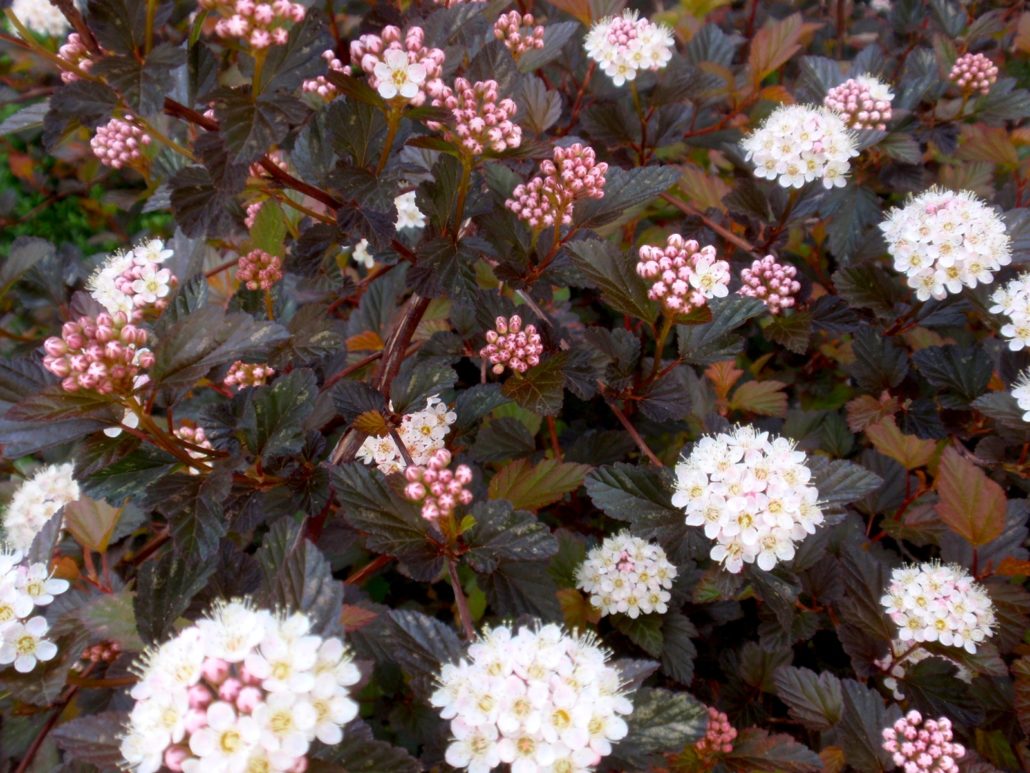
Physocarpus opulifolius „Diabolo„ (frunze rosii) Ferma Iancu
Rosaceae Genus: Physocarpus Synonyms: 'Diablo' 'Monlo' Type: Broadleaf Native to (or naturalized in) Oregon: No Deciduous shrub, upright, 10 × 10 ft (3 × 3 m). Leaves purplish-red during much of the growing season, but reportedly becomes dark green in areas with hot summers. White flowers and reddish fruit. Sun, to maximize purple color of leaves.
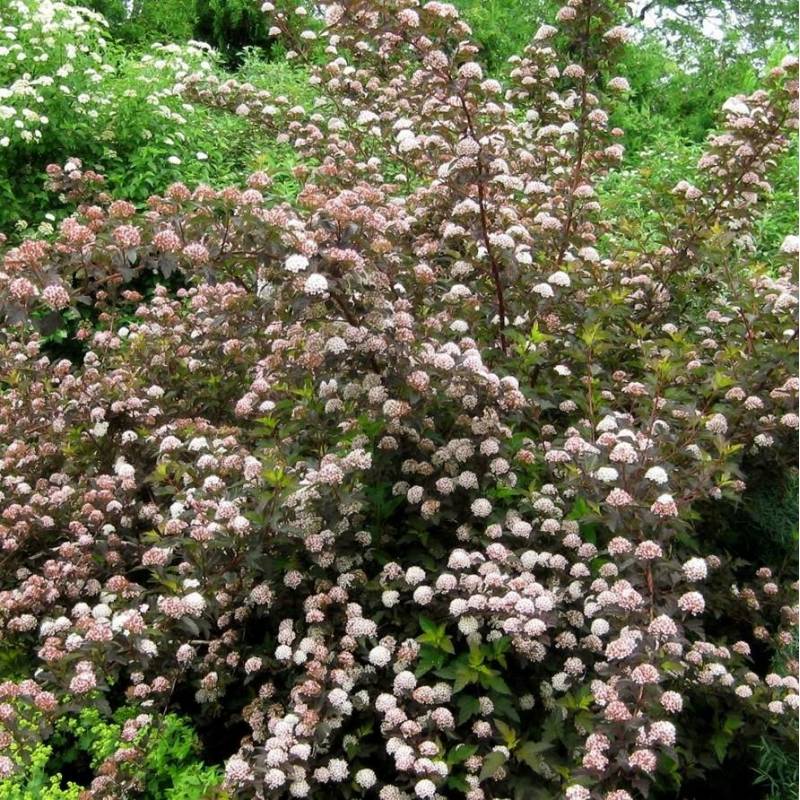
Physocarpus opulifolius 'Diabolo'
Diabolo® Ninebark, The stunning deep purple foliage of this versatile shrub makes it a standout in the garden. Plant en masse to create a richly colored, dense. Physocarpus opulifolius 'Monlo' Pronunciation: fy-so-KAR-pus op-yoo-lih-FOH-lee-us. SKU #06393. USDA Zone. 3-7. Your climate might be too cold for this plant:

Physocarpus opulifolius diabolo ninebark shrub Edge Of The Woods
| Updated on: July 12, 2022 The Diablo Ninebark is a member of the Rosaceae family and a stunning variety of the Physocarpus genus. Known for its tough overall toughness, the diablo ninebark has grown to become one of the most popular plant choices to come out of the North American wooded areas or rocky river backs.
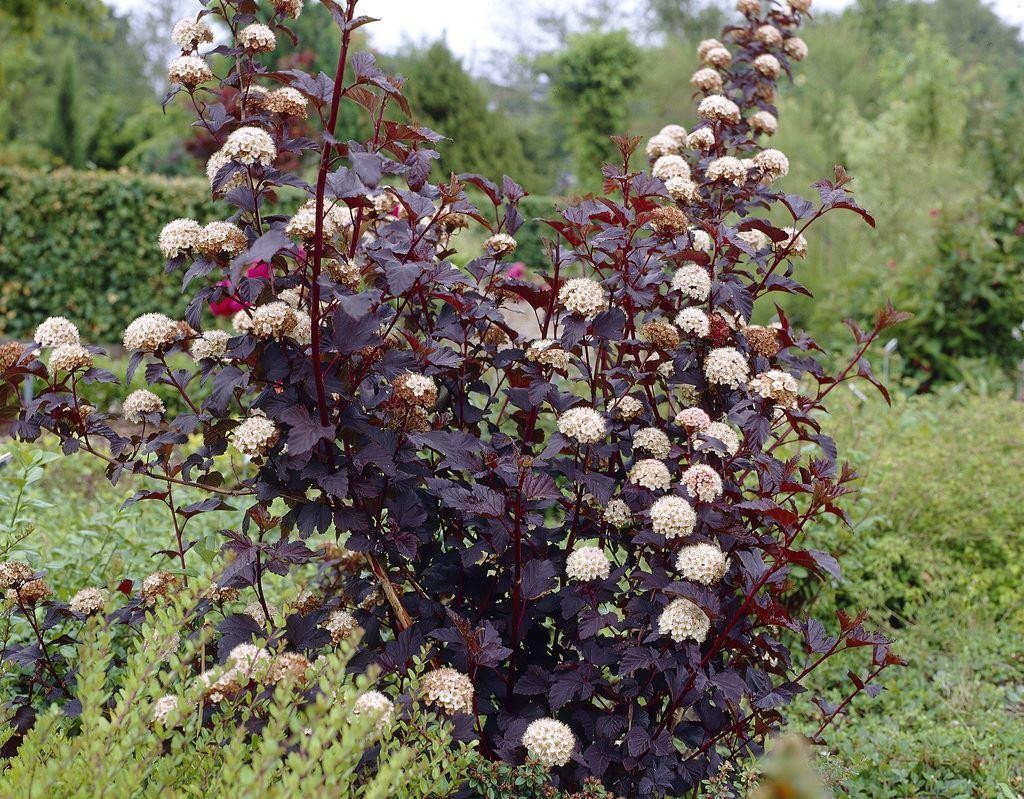
Physocarpus opulifolius Diabolo Ninebark
Prepare the container by filling with potting soil up to 2" (5cm) from the rim of the planter leaving some space in the middle for placing the plant. Remove the plant from its nursery pot. Insert the plant into the hole and press soil firmly around the roots. Add soil if necessary to cover the root ball.

Physocarpus opulifolius 'Diabolo' R Rotlaubige Blasenspiere
Ninebark (Physocarpus opulifolius) is a versatile and attractive deciduous shrub that is native to North America. Known for its stunning foliage and unique peeling bark, this plant is a favorite in gardens and landscapes. The name "Ninebark" is derived from the striking exfoliating bark that naturally peels away in layers, revealing.
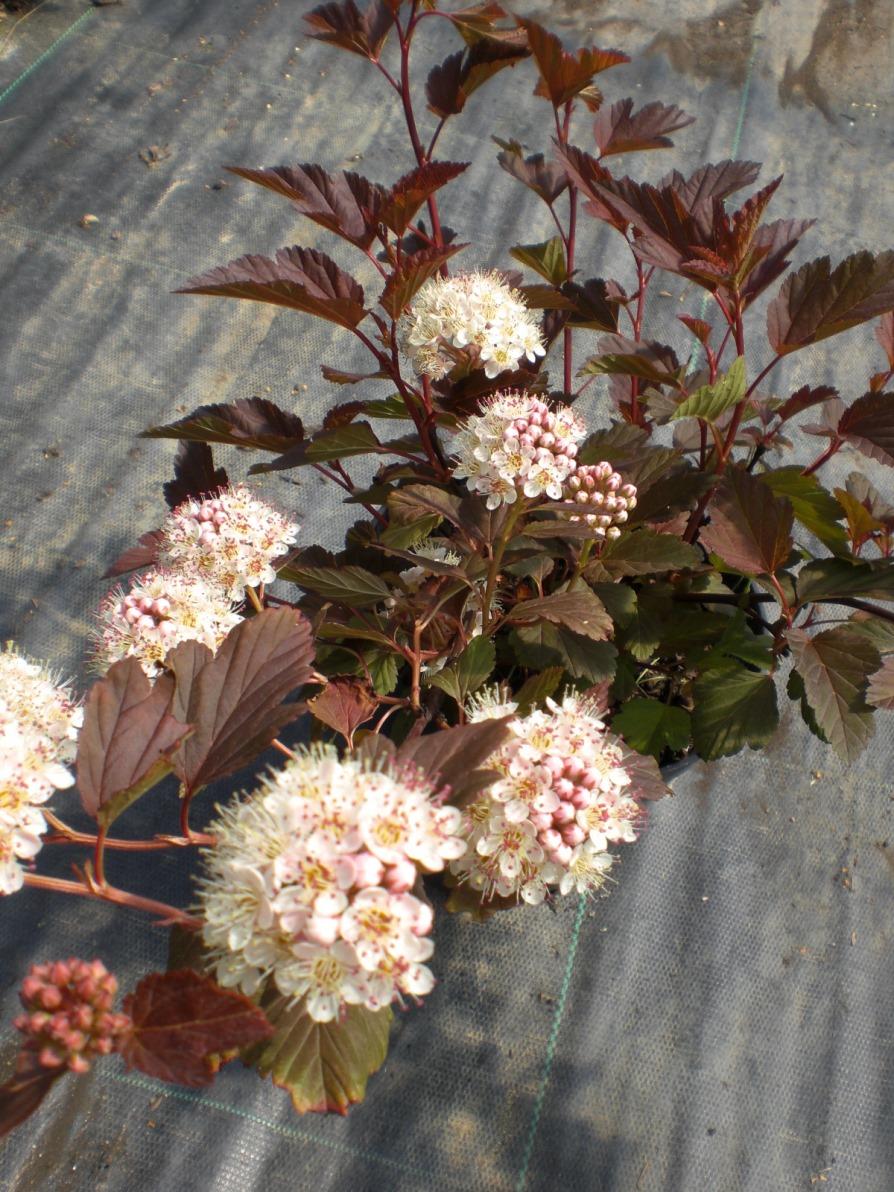
Physocarpus opulifolius Diabolo (PBR) AGM
Physocarpus opulifolius 'Monlo'. fy-so-KAR-pus op-yew-lih-FOE-lee-us. With its upright, arching branches and dark chocolate to purple foliage, Diabolo ® ninebark offers a color contrast with silver-leaved plants and makes a fine backdrop hedge. Clusters of button-like, pinkish white flowers appear in summer. Even when they fade to a tawny.
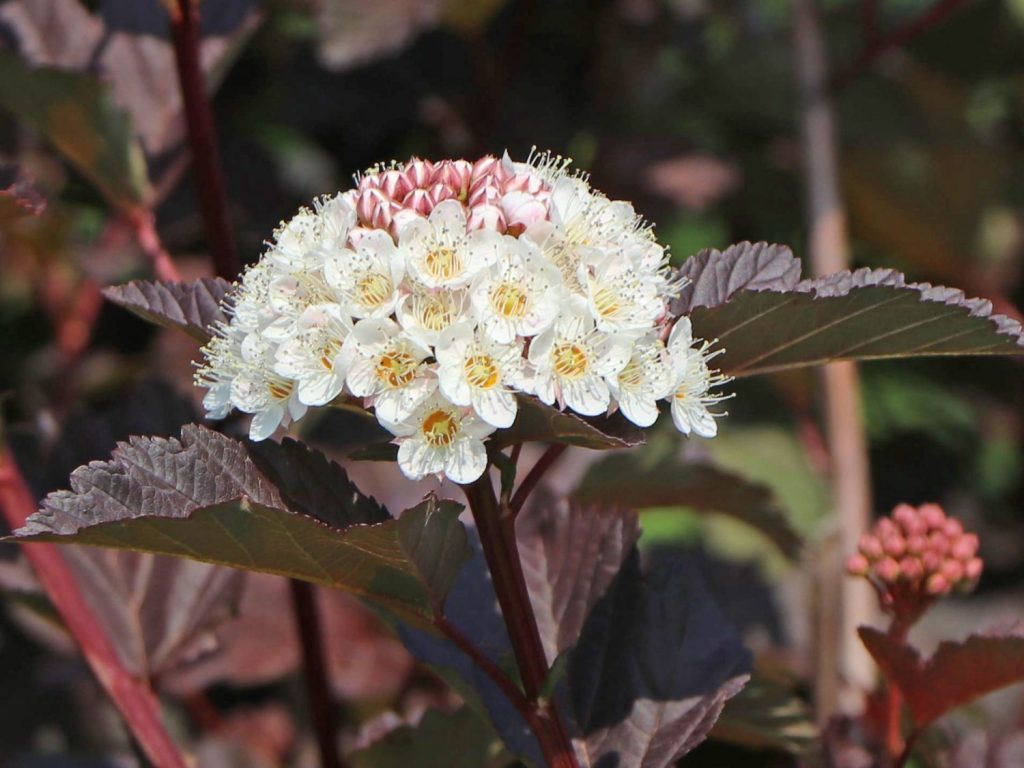
Physocarpus Opulifolius Diabolo » Akra Fide
A vibrant player in the landscape for the length of the growing season, award-winning Physocarpus opulifolius 'Diabolo' is a stunning purple-leaved ninebark cultivar with an exquisite fountain shape and incredibly decorative exfoliating bark.

Physocarpus opulifolius 'Diabolo' Ballyrobert Gardens
Physocarpus opulifolius 'Diabolo' Back to Previous Page More Images Common Name: ninebark Type: Deciduous shrub Family: Rosaceae Zone: 3 to 7 Height: 4.00 to 8.00 feet Spread: 4.00 to 8.00 feet Bloom Time: May to June Bloom Description: Pinkish-white Sun: Full sun to part shade Water: Dry to medium Maintenance: Medium Suggested Use: Hedge

Physocarpus opulifolius Diabolo SC PANDORA BLUMEN SRL
Physocarpus opulifolius (Common Ninebark) is a fast-growing, upright, spreading, deciduous shrub with an exquisite fountain shape and incredibly decorative exfoliating bark. Profuse creamy-white flowers, delicately pink-tinged, appear in dense, rounded clusters in late spring before they give way to drooping clusters of red fruit in fall. Rich in nectar, the blossoms attract plenty of.